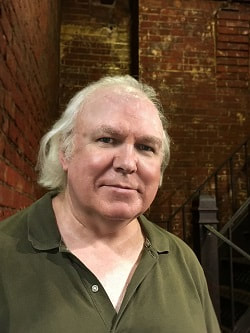AUTHOR PROFILE
Tim Suermondt’s sixth full-length book of poems “A Doughnut And The Great Beauty Of The World” will be forthcoming from MadHat Press in 2021. He has published in Poetry, Ploughshares, Prairie Schooner, The Georgia Review, Bellevue Literary Review, Stand Magazine, december magazine, On the Seawall, Poet Lore and Plume, among many others. He lives in Cambridge (MA) with his wife, the poet Pui Ying Wong.
|
Tim's work appeared in Pond 61
|
Why do you write?
Well, let me start off by agreeing with Stanley Kunitz who said a writer doesn’t know why he or she writes any more than a cat knows why it scratches a tree. I grew up when we didn’t have the array of entertainment systems, the internet, smart phones, etc. Even our televisions back them were rather primitive and going to the movies was almost a luxury. We traveled in books, books that we found on our own or were taught or recommended to us, and for some of us the seeds of writing were planted: we wanted to write something that moving, that powerful, that humorous, and I’m still giving it a try after all these years. I’m certainly not writing poems for money (“carpe per diem” as Robin Williams put it) but because I want to—it might be as simple as that. I just try to write the poems as best as I can, respect the craft and the art and send the poems to readers who might do me the honor of reading them. Since I believe that when a good poem is written the world, for a moment, becomes a better place—making the attempt and changing the world a hair might be of immense use.
What other creative activities are you involved in?
In one word: none. There was a time when I could play an instrument, do a decent painting and years ago I acted in the theater and did TV work in NYC, mostly in the background on soap operas and network shows—most of my very limited two (I think) movie appearances have disappeared via the cutting room floor. I also did some radio broadcasting. But writing is what I really wanted to do all along, and poetry most of all. I consider walking, cooking and being in love (and reading itself) creative activities of a sort. I couldn’t give Brad Pitt a run for his money, but I’m waiting patiently for his first written poem.
Who is your favorite author and why?
I love a lot of writers, but I’ll mention two: my wife, Pui Ying Wong, who’s a poet too (and the only poet in my orbit who’s won a Pushcart Prize) and the poet and essayist Adam Zagajewski who died recently in Krakow. I like how he incorporated traveling and cities in his work—he even had some nice things to say about Houston. I’m a city boy and travel when I can, so being cosmopolitan in outlook is a trait I’ve always admired. Zagajewski also weaved history, art, philosophy and religion into his personal poems and essays, often with a fine wit and the gravitas some Polish writers are seemingly born with. But probably most importantly is his insistence on not forgetting that great joys exist even in an all too often brutal world. Here’s a small example:
Write about those moments
when friendship’s footbridges
seem more enduring
than despair.
Write about love,
long evenings,
the dawn,
the trees,
about the endless patience
of the light.
Write about those moments
when friendship’s footbridges
seem more enduring
than despair.
Write about love,
long evenings,
the dawn,
the trees,
about the endless patience
of the light.
Tell us about the mechanics of how you write.
Before the computer, I wrote on regular white paper and later on yellow legal pads and then transferred everything to the typewriter. I even had at one time an old, weighty one from the 40’s—you could get a workout banging down on those keys! But now I do the work on the computer screen. I may jot down a line or an image on paper, but that’s about it. And I don’t glue myself to the screen and the desk. I begin the would--be poem in my head and can marinate it for days—only when I feel I have something worth starting will I get on the screen and put the poem, and me, through its paces. Lately, I’m finding that my marinating process is speeding up. Maybe I am getting younger, after all. But quick or slow, there’s often hard work to be done to get the poem into its best shape. The Muse refuses to let me be a slacker.
Finally, what do you think about Carp, the fish, not our website?
Well, I’ve always considered myself a rainbow trout man, although I think my fishing days are probably over. I remember fishing recently with family in Australia—after having caught part of a boot and some seaweed stuff I reeled in a fish so tiny I apologized to it and returned it to the river. As for the carp, I know it can be on the bigger side and can crowd out other fish in the same pool. I like that people can catch or buy the cheaper carp and enjoy it—utilitarian indeed, like poetry when you forget the business about it being useless. May Poetry and the Carp be with you!

